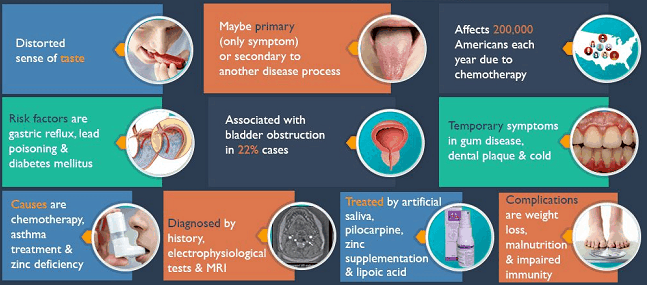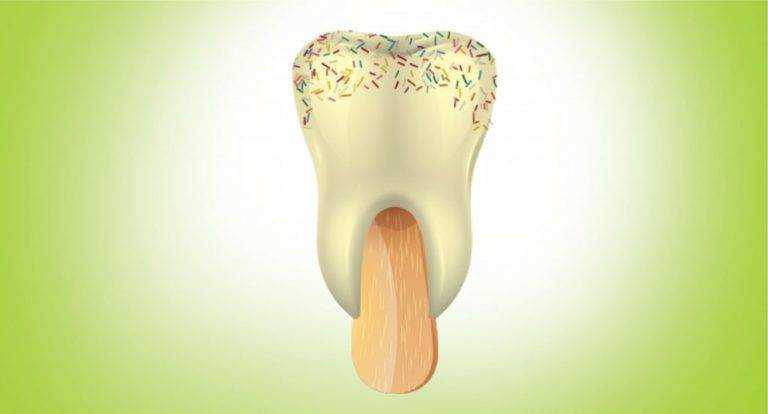It is an unusual taste or change in taste that won’t go away. It can be described as inadequate, metallic, salty or foul.
Your taste buds are found on your tongue and on the roof of your mouth. These cells collect information related to taste and send it to the brain.
Some people with dysgeusia also develop an altered sense of smell. About 75% of flavor and taste sensations come from nerve cells involved with smell. Both taste and smell cells work together to produce a sense of taste.
Our taste cells can identify four main qualities: sour, bitter, salty and sweet. More subtle aspects of flavor come from your sense of smell. Try this experiment. Take a sip of coffee or eat an orange slice while you hold your nose. It will be difficult to taste the flavor of the food or drink.
Dysgeusia is relatively uncommon. It can have numerous causes. Fortunately, many of the causes are temporary. For example, several infections can cause mild dysgeusia. They include the common cold, flu, sore throat, and nasal or sinus infections. Causes of dysgeusia are rarely life-threatening, but the disorder may affect your quality of life.
Other causes include:
- Smoking (especially pipe smoking)
- Gingivitis (inflammation of the gums)
- Periodontal disease (advanced gum disease)
- A dental abscess.
- Oral yeast infection.
- Certain medicines, including lithium, antibiotics, ACE inhibitors, and many cancer drugs.
- Dry mouth (xerostomia), which can be caused by many medicines
- Vitamin or mineral deficiency
- A brain tumor or trauma to the head
- Damage to the taste nerves
- Metabolic or endocrine problems, such as diabetes or thyroid disease
- Depression
- Surgery of the larynx (voice box)
- Head and neck radiation
- Migraine headache
- Bell’s palsy.
- Dysgeusia may also appear along with burning mouth syndrome or glossitis, and other oral conditions.
Symptoms:
Changes in the sense of taste (and sometimes smell) are the only symptoms.

Diagnosis:
Your dentist will ask about your medical history and will examine you. He or she also will ask questions related to the symptoms of metallic taste. The dentist also may discuss the possible causes (such as smoking, cold or flu). Make sure you tell him or her about all of the medicines you take, as well as any vitamins and herbal supplements.
Tests can be used to assess your senses of taste and smell. Certain chemical gives a certain taste, to produce specific tastes these chemicals are applied on your tongue. Sour, sweet, bitter, salty tastes— can be applied to areas of your tongue.
A “scratch and sniff” test is also in practice to check the sense of smell. The test uses special cards. Each one contains an odor that is released when scratched. You will be asked to identify the odor on each card.
Other tests that may be performed include imaging (MRI, CT scans), blood tests or saliva flow rate.
Expected Duration:
How long dysgeusia lasts depends on the cause. The problem can be solved once the root cause is removed. This can happen if the reason for the disease is gum disease, plaque, the medicine you are taking for a short time or a short-term condition such as a cold.
If the root cause is a yeast infection, the dysgeusia will disappear after the yeast infection is well treated. In some rare cases, dysgeusia can be permanent, for example- nerve damage.
Prevention:
There are some causes of Metallic taste in the mouth that can be prevented. Quitting smoking will develop your sense of taste and smell. Following good oral hygiene, getting regular dental care, and treating sinus problems also can help.
Treatment:
Many times, dysgeusia is treated by identifying and treating the cause. If the cause cannot be treated, your dysgeusia can be tough to cure. Treatment of dry mouth or oral infection is important that help people fight dysgeusia.
Expert opinion
Dr. Manan Dhulia Dental Director at Sabka dentist says “People tend to take lesser foods due to decreased taste sene. Having less healthy foods may cause weakness also decrease the ability to fight diseases.”
Dr. Preethi Nagarajan Dental Director at Sabka dentist says “When you feel the symptoms are not curing with the home remedies, it is best to consult your dentist. He will assist you with the further steps of the treatment.”
Dr. Zita Antao Dental Director at Sabka dentist says “The early diagnosis of the disease will give you the early healing. It will also save you from the suffering duration.”











One thought on “Metallic Taste in your Mouth?”
good article well written